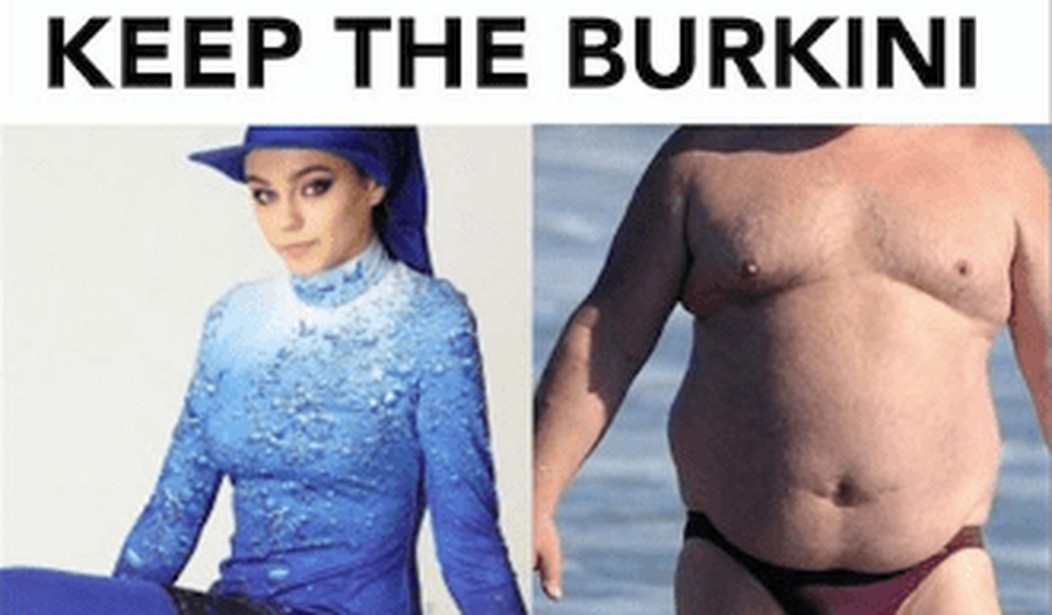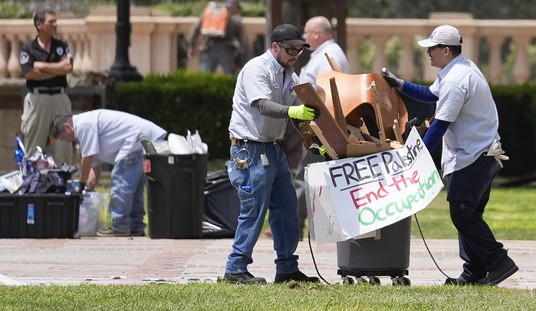See below for an update to this story.
In the wake of recent terrorist attacks by radical Muslim extremists in France, beaches have begun banning burkinis—full-body swimwear worn by Muslim women—at public pools and beaches because they’ve been deemed a security risk. The first ban was imposed in Cannes on the French Riviera and they’ve now spread to 14 other cities. Tensions over the minimalist dress code escalated this week when someone snapped pictures of police officers in Nice reportedly forcing a Muslim woman in Nice to partially disrobe.
Now, some people are wondering whether other swimsuits that make people uncomfortable should be banned. This guy will be the first to go if Paul Webb has his way:
Instead of banning the #burkini ban fat pasty guys in #Speedo ? pic.twitter.com/hl3I07GqkC
— Paul Webb (@thatpauloguy) August 25, 2016
Honestly, which would you rather look at?
Keep the #burkini. Ban the #Speedo. pic.twitter.com/hj5yAruyAh
— Henni Ahvenlampi (@HenniAhven) August 25, 2016
I’d say it’s past time for this:
Clearly, if there are now "Burkini Talks," there must also be a "Speedo Summit." https://t.co/QarSD7qUux
— Alex Wagner (@alexwagner) August 24, 2016
And here’s an important truth bomb:
https://twitter.com/bubba_clemson/status/767786854422896640
Only 100? Might want to check the math on this one:
If France are banning Burkini's then they really should ban speedo's too because they are 100x more offensive to everyone having to view it.
— • Emily • (@Emzileenie) August 24, 2016
“Lady, take off your shirt. It’s the law!” There’s something seriously messed up about this.
Fat man in speedo = moral
Woman not exposing her skin = immoral?
French law = ridiculous & cruel. #BurkiniBan https://t.co/YCcTj4c0uq— WhoopDiFrigginDoo (@WholeLottaJulie) August 24, 2016
Unfortunately for the Speedo haters, the clingy spandex swimsuits are actually mandatory in French pools. According to The Good Life France:
In actual fact, this is a law harking back to 1903 when longer swimming shorts were banned by the Government and despite this rather tricky subject being raised numerous times in the French Parliament for an update, so far it’s a firm “non”. If you do manage to make it into the pool in your normal swimming attire that doesn’t include Speedos – beware. Sirens will go off, lights will flash, crack squads of lifeguards will hunt you down and haul you out. Well maybe not lights and sirens but it will almost certainly result in the swimming attendant blowing a whistle, shouting at you and then if you ignore it, trying to fish you out with a hook.
The burqa and niqab were prohibited in public places in France in 2011 on the grounds that they are conspicuous religious symbols. But the “burkini” — a “burqa” and “bikini” combo — is technically still legal in the country unless prohibited by local bans.
Aheda Zanetti, who created the burkini and runs a swimwear business in Sydney, told the BBC that online purchases of the full-bodied suits were up 200% since July. She created them after noticing that Muslim women were being left out of beach life in Australia. “I wanted my girls to grow up to have that freedom of choice,” she told the BBC. “I don’t care if they want to have a bikini. It’s their choice.” Zanetti said that Christians, Hindus, Jews, and Mormons also purchase the suits.
Some have noted that Muslims aren’t the only women who cover up when they go to the beach.
https://twitter.com/Seditious_medic/status/767474779007938560
Obviously, it’s not exactly the same—not even close—because Catholic nuns are not running around slashing the throats of priests or mowing down Bastille Day celebrants in Nice. France’s lax immigration policies combined with low birth rates in French-born women have led to an explosion in the Muslim population—the highest in the European Union. Unfortunately, many of these Muslims refuse to integrate into France’s secular society and insist on living in separate Islamic enclaves that practice Sharia law. The burqa and burkini bans are (at best) lame attempts to put a bandaid on a gaping, bloody wound to a major artery. Rather than encouraging integration, such laws and bans will likely force these women, many of them already oppressed and isolated, deeper into seclusion.
Of course, with such laws there are always unintended consequences. Other women who value modestly are likely to be caught up in this French take-it-off dragnet (note that the woman who was told to take off her layers by police was not even wearing a burqa). So Catholic nuns, Amish women, and conservative Christian women might have to choose between disrobing or avoiding beaches with such policies. The Duggars are well known for wearing modest swimwear. Should Jessa be banned from the beach because of her “religious extremist” swimwear?
The temporary ban in Cannes is set to expire on August 31, but the debate over the display of religious symbols—and the overarching discussion about how to balance freedom and security—is expected to continue through the 2017 presidential elections in France.
No woman, whether she’s a Muslim, a Christian, an orthodox Jew—or just someone who doesn’t want the entire world to see her not-so-perfect upper thighs—should be forced to wear a skimpy swimsuit to the beach. (And the same goes for the men—I am pro-swim trunks at the pool!) Let’s hope these French beaches can find some kind of compromise that everyone can live—one that doesn’t involve police forcing women to basically strip down to their underwear.
***
UPDATE: On Friday France’s highest administrative court found the burkini ban in Villeneuve-Loubet “seriously and clearly illegally breached fundamental freedoms.” The ruling likely means the other bans will be overturned, say correspondents from the BBC. However, the cities of Nice, Frejus, and the Corsican village of Sisco, have vowed to keep the bans in place.










Join the conversation as a VIP Member